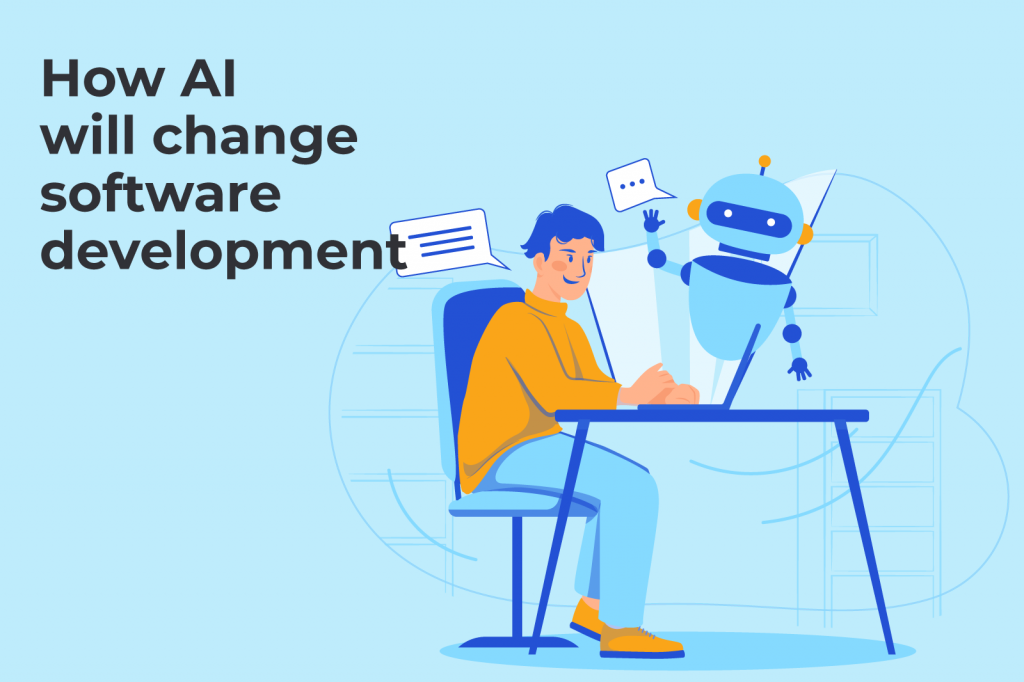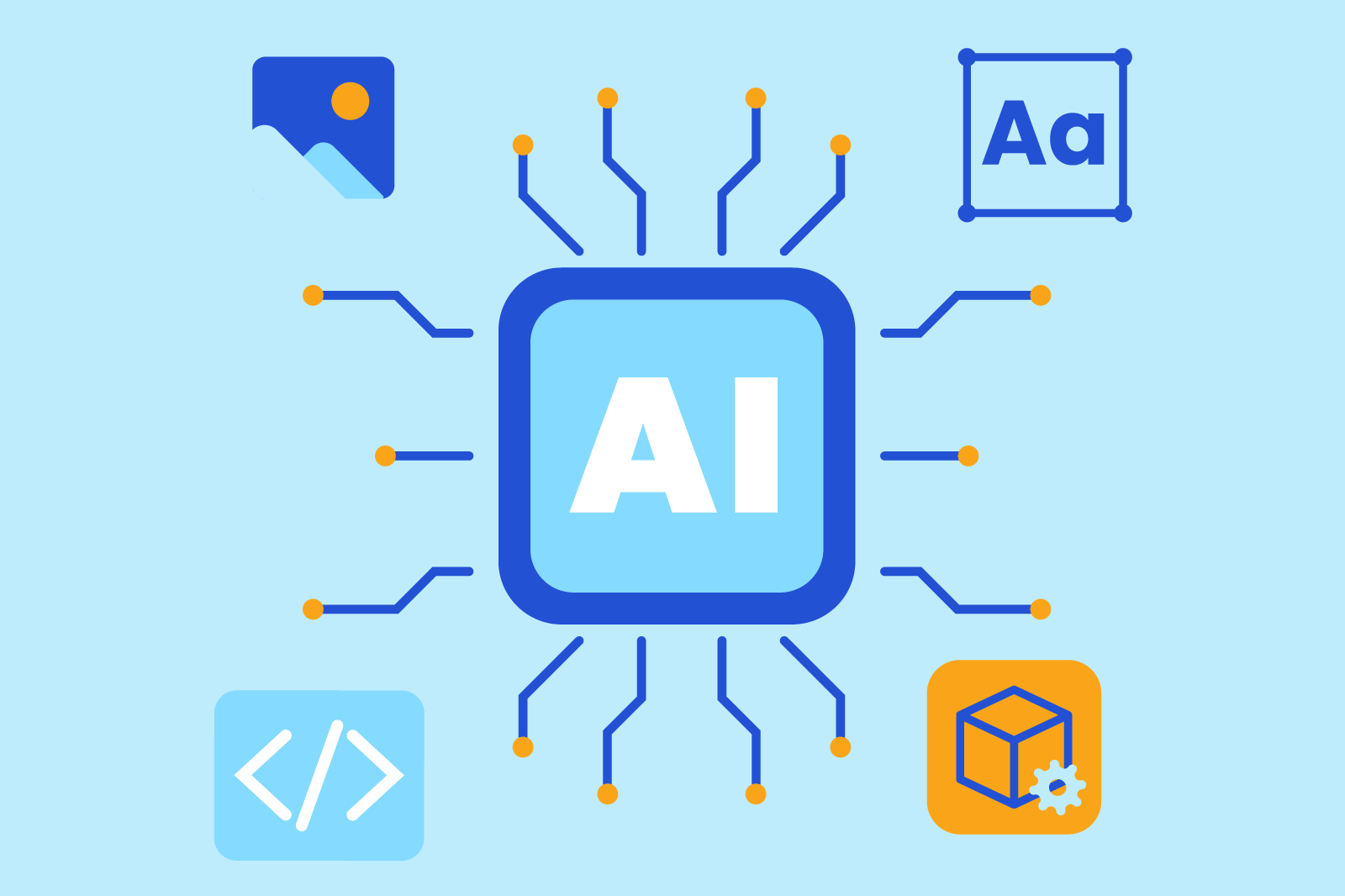
How AI will change software development
As AI continues its “conquest,” we asked our teams to delve into its implications, particularly in the field of software development. With a consistent impact in both business and social fields, people think yet again (similar to the industrial revolution) if their jobs will be replaced or become somewhat obsolete. In our offices, we asked how AI will change software development, the implications, how we already use it, and with what results.
How will AI transform software development?
The first thing that came to mind when discussing this topic with our teams was that software development is built on deterministic logic, which means that if you feed a set of inputs, you will always get the same output. Generative AI is based on probability, which means the output is never quite the same. AI uses complex models to predict a result or behavior. This fundamental difference makes answering this question anything other than a “walk in the park.”
With this in mind, we analyzed our entire process and split it into specific stages to define the impacts of AI on software development.
AI’s Impact on Discovery & Software Architecture
In this stage, software architects and QA define the project requirements, objectives, architecture, design, and acceptance criteria. AI can significantly help with the research phase. The architects will still have the upper hand regarding best business and industry practices and software know-how. Still, they can communicate their input to an AI model that can generate multiple iterations, most likely speeding up the process.
Currently, AI can’t decide on which software architecture will most likely have a more positive impact on the project; that’s why the software architect's experience and intuition are still essential.
AI’s Influence on UI/UX Design
Current AI tools, such as the much improved GPT-4, have the ability to analyze graphics and images, which can greatly improve the overall result of UI/UX designers. AI tools will become a proper “right hand” for designers as they can test their customer journeys and page designs without deployment. It is also likely that UI/UX designers will focus more on guiding AI tools in the actual process of creating design mock-ups and user flows rather than creating them by themselves.
That doesn’t mean they will become obsolete, but their focus will change, and they will be able to concentrate more on the creative side.

Coding in an AI-Enabled Environment
The potential of using AI for coding is already well known, and many software developers already use it. From our experience, the biggest downside is related to unreliability, as even the most advanced models still make mistakes. The experience and knowledge of the software developer become even more critical. While the actual process of writing code is greatly simplified and done faster, software engineers and developers will focus more on analyzing the code, making refinements, and polishing the output.
Because of this shift, we believe that prompt engineering will become a popular skill - software engineers will be required to create complex prompts, improving the overall development speed and creating an environment where it’s much easier to test different ideas.
AI’s Role in Testing & Deployment
Firstly, we believe AI will be instrumental in making deployment more efficient. AI tools can verify deployments, identify bugs, and flag abnormalities, significantly speeding up the process. The upside is obvious, but the downside is that testers will have even more on their plate because of the increased deployment rate. Luckily, AI will also be able to intervene here because of its ability to predict behaviors - which will help discover bugs even before the testing begins.
The real big change is that testers will most likely not spend most of their time on actual testing but on developing test architectures and new test functionalities.
AI in Software Maintenance
Maintenance is often tedious. It’s not just about fixing bugs or working on performance optimizations but also about keeping up with third-party integration requirements. If AI becomes an industry-standard in software development, some of these tasks are expected to be handled by AI and supervised by developers.
Can AI Replace Software Developers?
The short answer is no, but the long answer has a lot of facets. While we are sure that AI will not replace software developers in the foreseeable future, we believe it will change how and what software developers do. Currently, developers and engineers have many repetitive tasks that honestly are not a lot of fun. Writing repetitive blocks of code is something that AI can surely handle, but at the cost of quality and reliability. Software developers must understand the output, analyze the quality, and improve on it.
Efficiency and productivity are improved as developers can shorten the development time, but they still need advanced knowledge to validate and improve the code delivered by AI. We believe AI can’t replace software developers but will fundamentally change the development process, increase its pace, and create opportunities for more experimentation and creative thinking.
Another important change is the programming paradigm because, until now, it’s been considered to be outcome-oriented. AI will enable the rapid development of proofs of concepts, enable fast A/B testing, and improve deployment and testing; that’s why the entire paradigm will change to a goal-oriented process.
Will AI take over developers?
There’s an existential difference between being able to or actually replacing software developers. Based on our custom software development experience, we believe AI will not take over developers but act as an extension. AI will push the agile methodology to the next level of continuous delivery, where ideas are tested and deployed in a fast manner, and creativity will again take the front seat as repetitive tasks are taken over by AI.
Are there any downsides of AI in software development?
Even though AI will bring immense gains in productivity and efficiency, it’s not all milk and honey. There are two significant concerns raised by our teams. The first is that AI requires a competent developer to oversee and improve its output; moving the code writing responsibility more and more to the AI means that developers will eventually lack the code writing exercise. Secondly, we believe that it’s often easier to build something from scratch than fix something done by someone else. When you create something by yourself, you know all the ins and outs - you know where to look for mistakes. The output of AI will feel like taking over a project that’s not entirely yours, which will become more challenging to fix and maintain.
Conclusion
AI is creating a new era for software development, offering unprecedented speed and efficiency. Will it replace software developers, though? We think not, but it will surely transform their roles. Experimentation and creativity will become fundamental again, with developers having more time and better tools to push their work further than ever before.
Looking for your next AI Software Development Partner?
Ready to leverage the power of AI in your software product? Let’s have a chat or request your personalized quote.
Article written by Iulia Filimon, NLP Engineer
Iulia designs and develops algorithms and models that enable computers to understand, interpret, and generate human language. She participates in building the first innovative AI company's solutions and exposing them to clients.